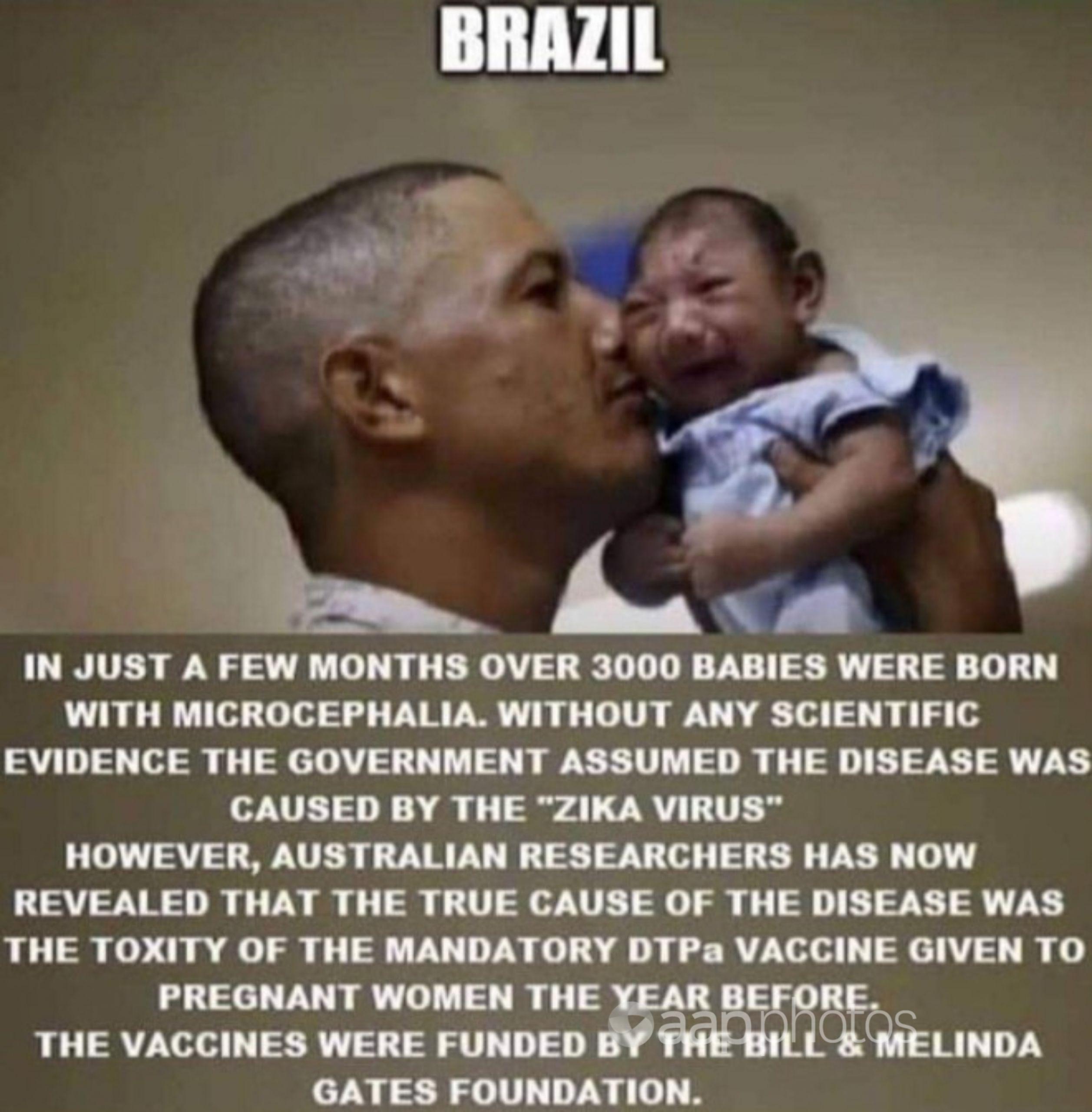The Statement
A social media post claims a spate of birth abnormalities in Brazil have been linked to vaccinations provided to pregnant women with “Australian researchers” supposedly responsible for discovering the “true cause” of the problem.
A Facebook user in Australia shared a meme on March 11 that states: “BRAZIL. IN JUST A FEW MONTHS OVER 3000 BABIES WERE BORN WITH MICROCEPHALIA. WITHOUT ANY SCIENTIFIC EVIDENCE THE GOVERNMENT ASSUMED THE DISEASE WAS CAUSED BY THE ‘ZIKA VIRUS’.”
Microcephaly – misspelled in the post as “microcephalia” – is a condition in which babies are born with a small head or the head stops growing after birth.
The meme continues: “Australian researchers has (sic) now revealed that the true cause of the disease was the toxity (sic) of the mandatory DTPa vaccine given to pregnant women the year before”.
The meme goes on to claim the DPTa vaccine – used to immunise children against tetanus, diphtheria, and pertussis – was funded by the Bill and Melinda Gates Foundation.
In an accompanying caption on the post, the Australian Facebook user who shared the meme also accuses Bill and Melinda Gates of “damaging 3,000 children in Brazil and 47,000 children in India” with vaccines.
At the time of writing, the March 11 post has been viewed around 134,000 times and shared more than 500 times. A meme with very similar wording was earlier posted on a website called “America’s best pics and videos”.

The Analysis
There is no basis for the post’s central claim that researchers, either in Australia or elsewhere, have discovered a link between the DTPa vaccine and microcephaly.
Nor is there any basis for the suggestion that the Bill and Melinda Gates Foundation funded the vaccines in Brazil, or that the philanthropist duo are responsible for harming children there and in India through inoculations.
Combination tetanus, diphtheria and pertussis vaccines are administered to children in many countries, including Australia, with proven benefits.
A form of the vaccine known as dTpa was introduced into Brazil’s national immunisation program for pregnant women in November 2013 with the goal of reducing the incidence of pertussis, commonly known as whooping cough, in newborns.
Very young children are particularly susceptible to the effects of pertussis, which can be deadly. Brazil had previously used another form of the vaccine in its national immunisation program since the 1970s. The capitalisation and order of letters in the vaccine’s name varies depending on how it is formulated.
There was a significant increase in microcephaly in Brazil in 2015, during which 4180 suspected cases were reported to authorities. However, researchers have linked the spike in cases to the Brazilian Zika virus epidemic, not vaccines.
Malini DeSilva, from US non-profit healthcare provider HealthPartners Institute, has studied the alleged vaccine connection says the introduction of the inoculation program and a rise in microcephaly cases in Brazil was purely coincidental.
“During 2015–2016, there was an increase in microcephaly cases in Brazil, which, while likely associated with maternal Zika virus infections, also temporally overlapped with Brazil’s introduction of a tetanus, diphtheria, and acellular pertussis (Tdap) maternal immunization program.” Dr DeSilva told AAP FactCheck.
“We believe this was the beginning of the (claimed) association between Tdap and microcephaly. I do not know of any evidence to support the information included in the meme.”
Multiple studies have similarly concluded there is no evidence dTpa vaccines cause harm to the fetus or newborn babies.
A 2018 study led by researchers from the University of Pernambuco, Brazil, investigated the cause of microcephaly in 91 babies born in the city of Recife between January 15 and November 30, 2016.
After testing the blood of newborns with microcephaly and comparing the results with a control group, the researchers confirmed an association between microcephaly and congenital Zika virus infection but found no evidence microcephaly was linked to dTpa vaccines.
A 2019 study of 1462 new mothers in Brazil also found no increased risk of abnormalities in babies born to women who received the dTpa vaccine.
Health experts have previously rebutted claims by Australian anti-vaccination activists that the dTpa vaccine causes birth defects. In 2016, social media posts suggesting a link between the vaccine and microcephaly were dismissed by Australian researchers as “absurd” and with “no scientific basis”.
AAP FactCheck asked immunology specialists in Australia if they were aware of any local researchers finding a link between the DTPa vaccine and microcephaly, as claimed in the social media post.
Professor Cheryl Jones, a paediatric infectious disease expert at the University of Sydney and former president of the Australasian Society for Infectious Diseases, dismissed the claim as false.
“There is no credible Australian research or evidence from anywhere else that (maternal) DTPa or any other vaccine causes microcephaly in Brazil or elsewhere,” she said.
Professor Terry Nolan, head of the Vaccine and Immunisation Research Group based at the Doherty Institute in Melbourne, called the Facebook post “strange stuff”.
“I’m not aware of any Australian research linking Tdap vaccine to microcephaly, nor of any other link or credible biological mechanism,” he told AAP FactCheck in an email.
AAP FactCheck also examined the claim that the Bill and Melinda Gates Foundation funded the Brazilian dTpa vaccines.
While the foundation has previously funded various projects relating to diphtheria, tetanus and pertussis, including research into dTpa vaccinations for pregnant women, the dTpa vaccination program in Brazil is provided by the Brazilian Ministry of Health, not the Bill and Melinda Gates Foundation.
A foundation spokesperson confirmed to AAP FactCheck that the Gates organisation has not funded any DTPa vaccine studies in Brazil.
There is no evidence Bill and Melinda Gates have caused harm to “3,000 children in Brazil”, an accusation that seems to be based solely on false claims about the dTpa vaccine and secondary misinformation that these vaccines were funded by the Bill and Melinda Gates Foundation.
Similarly, there is no evidence Bill and Melinda Gates have harmed “47,000 children in India” with vaccines, a claim that stems from a 2012 report published in the Indian Journal of Medical Ethics about a rise in cases of “non-polio acute flaccid paralysis” (NPAFP).
Full Fact found that while it is true observed cases of NPAFP increased in the mid-2000s in areas where the vaccination work was concentrated, there is no proof polio vaccines were to blame. A 2013 BBC article pointed to better monitoring of NPAFP as one possible reason for the reported increase.
Claims that Bill Gates has paralysed Indian children with polio vaccines have been debunked many times, including previously by AAP FactCheck, as well as by India Today and PolitiFact.
The Verdict
Australian immunology experts have told AAP FactCheck they know of no research linking a spike in cases of microcephaly in Brazil to dTpa vaccines administered to pregnant women. Multiple studies have found no causal connection between the two, instead identifying the Zika virus as the likely source of the condition.
The claim that the Bill and Melinda Gates Foundation funded maternal dTpa vaccines in Brazil is also false. The vaccines are part of a Brazilian government immunisation program administered by the Brazilian Ministry of Health. Claims that Bill and Melinda Gates are responsible for widespread vaccine-related harm in India have been debunked several times.
False – Content that has no basis in fact.
AAP FactCheck is an accredited member of the International Fact-Checking Network. If you would like to support our independent, fact-based journalism, you can make a contribution to AAP here.
All information, text and images included on the AAP Websites is for personal use only and may not be re-written, copied, re-sold or re-distributed, framed, linked, shared onto social media or otherwise used whether for compensation of any kind or not, unless you have the prior written permission of AAP. For more information, please refer to our standard terms and conditions.


















